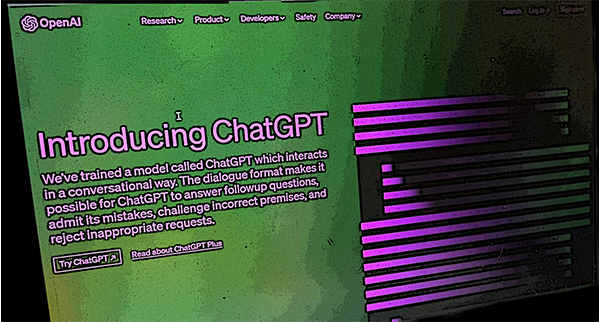You’ve probably been hearing a lot about ChatGPT and have maybe even seen some of the output it–and other artificial intelligence (AI) software–have been producing. But what does ChatGPT really do, and how can it be used?
ChatGPT (or Chat Generative Pre-trained Transformer) is a massive language model developed by OpenAI. Released free to the public in November of 2022, it draws from organized, text-heavy datasets (e.g., Wikipedia, Pubmed, patent databases, news articles, customer records, literature) to provide accurate and reliable responses to questions or queries, learn tasks with human supervision, generate personalized recommendations or segmentation of data, and contribute to narrative understanding, storytelling abilities, and literacy language patterns.
Although the core function of ChatGPT is to mimic a human conversation, it’s being used by companies to enhance customer experiences, rapidly summarize and create reports, assist with coding, and integrate into internal messaging apps. As part of our own ongoing efforts to test and integrate cutting-edge tools into our consulting process, Newry has evaluated the ability of ChatGPT to augment market insight and strategy work. We’ve found there is genuine value in ChatGPT’s capacity to augment large volumes of information–e.g., by summarizing academic research on a niche topic, generating a list of leading OEMs in certain industries, or estimating material costs by area. It also functions well as a “devil’s advocate” if asked to provide arguments against a certain decision or action, which may help users check their logic or think outside the box. Leveraging ChatGPT in these ways allows our consultants to work even faster and smarter to deliver answers to our client’s most critical issues.
That being said, ChatGPT has many significant drawbacks that limit its utility as a tool for gathering market insights or addressing strategic questions. The most significant of these include inability to:
- Comment on the world and events from the last ~18 months due to lagging data sets
- Differentiate between trustworthy and untrustworthy sources (even when given a description of which sources to draw from)
- Engage in probabilistic thinking
- Manipulate or analyze complex data
One of the most concerning shortcomings of ChatGPT is its propensity for AI overconfidence or “hallucination.” This known AI problem causes the tool to put confident responses that are not justified by its training data–for example, by inventing a product brand name for a technology that has not yet been commercialized. Thus, anyone using ChatGPT for research or insight-gathering purposes must be diligent in double-checking its conclusions (which may nullify some of its efficiency value). There are also issues and concerns over the security/confidentiality of inputs, which has caused several companies (e.g., Samsung, Amazon, JPMorgan Chase, Bank of America, Goldman Sachs, Deutsch Bank) to restrict their employees from using it.
Overall, ChatGPT offers an array of exciting new capabilities related to information gathering and synthesis, but there are other use cases that might be even more compelling in the future (e.g., process optimization, predictive maintenance, quality control, robotics, inventory management, supply chain management, etc.). For Newry and our clients, judicious use of AI software can support early-stage strategic marketing for innovative technology development, but these tools are no substitute for critical thinking, interpersonal networks, and common sense–at least, not yet!
Find out how Newry can help your organization anticipate future needs and stay ahead of disruptions. Don’t wait until you’re left behind.
